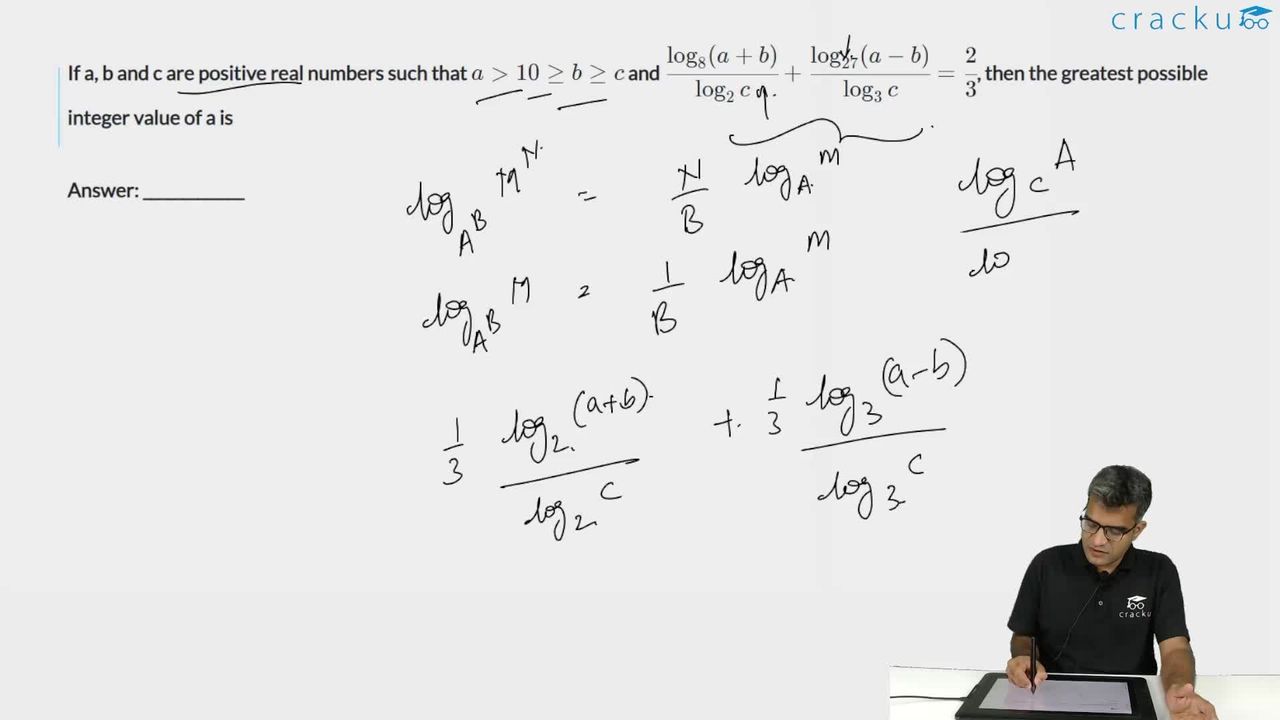If a, b and c are positive real numbers such that $$a > 10 \geq b \geq c$$ and $$\cfrac{\log_8 (a + b)}{\log_2c} + \cfrac{\log_{27} (a - b)}{\log_3c} = \cfrac{2}{3}$$, then the greatest possible integer value of a is
Correct Answer: 14
The first term of the expression can be rewritten as $$\frac{\frac{1}{3}\log_2\left(a+b\right)}{\log_2c}$$
Using the property $$\frac{m}{n}\log_ab=\log_ab^{\frac{m}{n}}$$ this can be rewritten as
$$\frac{\log_2\left(a+b\right)^{\frac{1}{3}}}{\log_2c}$$
And finally using the property $$\frac{\log_ba}{\log_bc}=\log_ca$$, we can rewrite the expression as
$$\log_c\left(a+b\right)^{\frac{1}{3}}$$
Doing identical operations in the second term, we get the entire left-hand side to be:
$$\log_c\left(a+b\right)^{\frac{1}{3}}+\log_c\left(a-b\right)^{\frac{1}{3}}$$
Using property $$\log_ca+\log_cb=\log_c\left(ab\right)$$ we get
$$\log_c\left[\left(a+b\right)^{\frac{1}{3}}\left(a-b\right)^{\frac{1}{3}}\right]$$
$$\log_c\left[\left(a+b\right)\left(a-b\right)\right]^{\frac{1}{3}}$$
$$\log_c\left[\left(a^2-b^2\right)\right]^{\frac{1}{3}}$$
This expression is given to be equal to 2/3
Using the definition of log: $$\log_cN=a\ $$ which is $$c^a=N$$
we get:$$c^{\frac{2}{3}}=\left(a^2-b^2\right)^{\frac{1}{3}}$$
Cubing both sides:
$$c^2=a^2-b^2$$
Finally giving $$a^2=b^2+c^2$$
We have upper limits on b and c as 10, and we want to maximize the value of a squared.
This can be thought of as a right-angled triangle, and the value of a will be maximum when both b and c are equal to 10, giving $$a^2=200$$, but this would not give an integer value of a
We need to adjust $$a^2$$ to the biggest square less than 200, which is 196
Giving the value of $$a$$ as 14.
Therefore, 14 is the correct answer.
Video Solution

Create a FREE account and get:
- All Quant CAT complete Formulas and shortcuts PDF
- 38+ CAT previous year papers with video solutions PDF
- 5000+ Topic-wise Previous year CAT Solved Questions for Free




